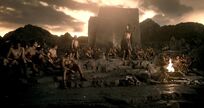This play takes place in 480 BC like the previous one. The king of Persia at that time was Xerxes, whose name means "ruling hero". His father Darius was a radical jihadist dictator who believed in the good god Ahura Mazda, who represented the light, and felt that he had a sacred mission to eliminate [burn to death] all false gods in the world who believed in lies. In view of his glorious record of being invincible, Darius naturally believed that the territory of the Persian Empire could be expanded indefinitely, and there would be no over-expansion at all. In 490 BC, he sent Medes general Datis [note that it was not Darius himself, so he was shot to death, so I can only say that the writer has a big brain] across the Aegean Sea, fought against the Greek allied forces in the Marathon plain, and was eventually killed by the Greeks. The elite heavy-armored infantry was ruthlessly crushed in tactics and equipment, losing 6,400 people and returning home [Many people suffered from the loss of the terrain and drowned in the swamp near the camp]. In the play, a group of men in underpants fights the Persian soldiers with scales, which is purely malicious. The Greek heavy armored infantry has a set of equipment of more than 30 kilograms. In addition to its own weight, it is basically a group of small humanoid tanks that charge on the battlefield. Normally, the training is to wear bronze armor and lift shields to collide with each other until the shield smashes. At that time, it was summer, and the Persian regiments were all lightly loaded. Wherever they could withstand the crushing of tanks, most of them fainted and died after hitting. The Greek coalition achieved an overwhelming victory. In the battle, a hapless infantryman caught the stern of the enemy ship but was chopped off. He is the brother of the playwright Aeschylus. Later, Aeschylus wrote a "Persian" mocking the invaders from the East, and won the first place in the Bacchus Festival drama competition.
After Xerxes ascended the throne, he inherited his father's unified thinking and decided to continue the West Expedition. But for him, this Western Expedition is not just about expanding the territory, but also an empire military parade and a show of empire strength. The Persian Empire was a superpower at that time, and many newly conquered colonies had never seen their own king. The Western Expedition just gave Xerxes an opportunity to review the governors of all territories, appreciate the sentiments of the people, and express his kingly demeanor by the way. At that time, the Persian nobles paid great attention to their appearance. They always took a makeup artist with them when they went out, and they wore high heels and fake beards for fear that they were not beautiful enough. The high price of fake beards is equivalent to luxury goods, and the government has to levy taxes on fake beards. And Xerxes is said to be the most outstanding and tall beautiful man among Darius’ sons [so the two-meter-high golden eyeliner in the play is drawn like a drag queen, maybe it’s true...]
To make a long story short, in the United States Called by the man Xerxes, the messenger galloped to every corner of the empire and conveyed the command to the governor to recruit troops. The infantry includes India, Ethiopia, Assyria, Thrace, race, Medes, and Persians. The latter three are the main forces; the navy consists of Egypt, Phoenician, Silesia, Ionian and Kalia. The navy consists of a huge fleet of 1,207 ships. Among them, Sidon (Phoenician city-state, known for its navigational technological innovation) and Kalia have the most powerful navies. The capital of Kalia is called Halicarnassus, and it is ruled by Queen Artemisia I...Huh? That's right, the heroine! But they are not some Greek slaves rescued by the Persian ambassador, but the true queen of Kalia. Thirty years later, the historian Herodotus, who was also born in Halicarnassus, described her like this: "This scary woman is full of adventurous spirits like a man." Although she wore gold and silver jewelry, sprayed perfume, and Wearing the expensive purple robes produced by Phoenician, but the ability to command battles is second only to the Sidon fleet, and is known as the second in the world. In addition to her own navy, she also joined the battle with the fleets of three other city-states that she had conquered. The enraged Greek male prostitutes offered a reward of 10,000 drachmas to capture her alive, because they could not tolerate a woman who led the army to attack them!
Just when Xerxes led a land and sea army with a total of more than one million, he drove through the two-mile pontoon bridge over Hellespong and the canal dug out under Mount Athos [it is completely the oil tyrants of the Middle East. The style of money] When marching to Greece, the free federal democratic government was fighting fiercely in its nest. Less than a year after the Marathon, Greek politicians conspired to get rid of the then coalition commander Mitayade, fearing that his reputation would affect their governance. They also invented a game called Pottery Exile, and vote for exile if anyone is upset. Another soul figure of the former coalition, Themis Stockley, is more cunning and knows how to survive among politicians. He did not get involved in the muddy waters of the political arena, but vigorously advocated transforming Athens into a first-class maritime power and divert the attention of the old political cadres. It just so happened that Laurie Um discovered a silver mine, making this proposition economically possible. So the Corinthian craftsmen rushed to build the warship with the speed of two weeks, and built a total of two hundred three-section radial ships, which saved the whole of Greece in the subsequent Salamis naval battle. And the leader of this fleet is naturally Themis Stockley. He was called "the most cunning snake in Greece" by the Persians, rather than the Athens general with the largest pectoral muscles.
Hearing that the millions of Xerxes were approaching, the Athenians went to Delphi to ask for an oracle. The priestess Pitya happened to be a bit high, and she said: Athenians! Why are you still not running! The messenger of Athens was so scared that the priest felt too scared, so he said a nice verse to appease the Athenians.
Everything in Athens will fall
. Only the wooden wall will survive. Only the wooden wall can survive.
This is Zeus’s guarantee to Athena, and it is also an aid to you and your children.
Sacred Salamis-you will be a lot.
The moment when the mother’s son is used as a grave is either the time of sowing or the time of harvest
Themis Stockley was amused, the wooden wall? The boat is also made of wood! The oracle is talking about ships! Then vigorously advocated that the defense of Greece can only rely on its own fleet. His persuasive skills must be full, and he has succeeded. So a total of 270 ships of the Allied forces led by Themistok sailed into Artemisius, and King Leonidas of Sparta also took five thousand coalition forces to Hot Spring Pass to die. Although Leonidas was deified infinitely later, he was able to ascend to the throne because he killed his brother and married his only daughter, his niece [Queen Sesi focused on incest for two thousand years], and inherited the old man. All of Brother's property. So he can calm down in the hot spring pass, which means a bit of atonement in it. Moreover, it was not only the Spartan 300 soldiers who guarded the hot springs, but also their slaves, some of the Debeskies [run a lot of halfway] and Thespeya [struggled to fight until the last minute], the total number was about [One thousand and five hundred] Around. Although the real situation is tragic and strong, it is a pity that only the Spartan warriors were left behind, and it was forgotten that the free city states also had slaves.
While Leonidas fought the hot springs, Themis Stockley and the navy also achieved a certain victory. In the first two days, the Persian fleet suffered a storm and damaged four hundred ships [a full one-third. Before the Persian army entered the territory of Greece and did not advance immediately, but to show off their wealth, they first celebrated a festival, and also held grand rowing and jockey events. They waited until the monsoon season to start the war. 】, and then a defected Greek in the Persian fleet [the Greek spy in the play] revealed the fleet’s combat plan, which enabled Themis Stokes to exit the port in time and successfully intercepted. He smashed many enemy ships with the bronze horns. Thirty ships were captured. But on the third day, the annoyed Persian Navy launched a full-scale offensive. The Greeks lost more than half of their ships and retreated to Salamis.
The defeated Greeks had only 180 ships left in their hands, but they had to face the Persian fleet three times more than their own. The democratic camp was filled with a strong atmosphere of pessimism. The Persian spies did not lose the opportunity to start their actions, and promised that once they surrendered, there would be a lot of gold. The big bosses of the Peloponnese were already ready to collect money and run away to become a colony, but Themis Stockley played a ruthless trick. He sent his cronies to meet with Xerxes, expressing his long admiration for the king's name and his intention to surrender on behalf of Athens, but the Peloponnesians are planning to escape. I wholeheartedly hope that Persia's victory will not let them go. Xerxes was also persuaded by Themis Stockley's S-level incitement skills, and sent someone to block the strait. Themis Stockley immediately turned his head and gave a generous statement to the Greek compatriots, comrades, look at the Persian dog blocking us on the shore, we can't run even if we want to, it is better to take up arms and fight back! So the gays immediately fought with passion.
In fact, after the withdrawal of the Greek army, Xerxes summoned admirals to discuss whether to pursue the Greek navy. As a result, everyone voted unanimously to fight again. Only the great queen Artemisia raised an objection. She believed that winter was approaching and the Persian army had insufficient supplies in the enemy's hinterland, while the Greek army had a geographical advantage and was easy to defend and difficult to attack. Now that Athens has been occupied, it is better to starve the Greek army and force them to run home. In addition, there are unreliable partners like the Egyptians in his team. Xerxes admired her shrewd analysis, but still followed the opinions of most generals.
As the oracle said, a battle for Salamis is inevitable. The Persian navy rushed into the autumn fog, only to find that the Greek warships that had thought they had escaped were waiting. The fleet that entered the strait in front has no room to turn back, and the warships behind are still squeezing forward, for fear that all the exploits of killing the Greeks will be robbed by the front. Due to the excessive number of ships, the flexibility of the Persian fleet was greatly frustrated, and only the Greek army blocked the maniac share. In the melee, Xerxes’ imperial brother and the commander-in-chief of the Phoenician fleet were killed by the Athenians. The Phoenician fleet, which was known to be the strongest, immediately swarmed into chaos and was forced to one side by the wedge-shaped formation of the Greeks. Artemisia, the second-powerful queen of the Imperial Navy, was completely a master of the wind. As soon as the Persian fleet was gone, she immediately set sail and fled. On the way, she also sank a friendly city-state ship that had had a dispute with her. The Greeks didn't pursue her when she saw her knocking over the Persian ship, while Xerxes stood on Mount Egarios watching the battle, and did not see which side she hit, and they were full of praise for her heroic behavior. In fact, there are two sets of flags on the Queen's ship, one for Persian, for use when fighting against Greeks, and one for Greek, for use when fighting against Persians. At this time, she changed into the Greek flag and left like this, leaving the imperial navy in a mess and letting others slaughter her.
When the sun went down in the afternoon, the Salamis defense battle finally ended. The battle smashed the imperial navy, and Xerxes almost gave up the idea of going west. Mindful of Artemisia’s pre-war warning, he once again consulted the Queen. The Queen said: Your Majesty, you burned Athens. What are you still consuming here? Let your general go to war with the Greeks, and you can go back to Persia to enjoy everyone's life. Xerxes felt very reasonable, so he left... his illegitimate child to the Queen's care.
However, Xerxes' general Maldonius and 300,000 soldiers were also beheaded by the Greeks. From then on, the Persian Empire completely abandoned the idea of expedition to the west. The countless tribal soldiers, wealth, and all kinds of extravagant pomp and display used by the two kings of Darius and Xerxes were all put in the dust. Xerxes's chariot drawn by eight pure white Saints was finally driven away by a group of Thracian robbers and abandoned in the wilderness.
As a hero, Themis Stockley was exiled by the resentful Athenians after ten years in power. He chose Persia as his final destination, where he received the courtesy of the son of Xerxes and was sent to Miletus, a commercial hub on the east coast of the Aegean Sea, to fight against his compatriots until he swallowed his last breath.
It is said that Queen Artemisia later fell madly in love with a man but did not get anything in return, and jumped into the Aegean Sea to commit suicide.
History has always been so dog-blooded. It's worse than such a bad film.
View more about 300: Rise of an Empire reviews











